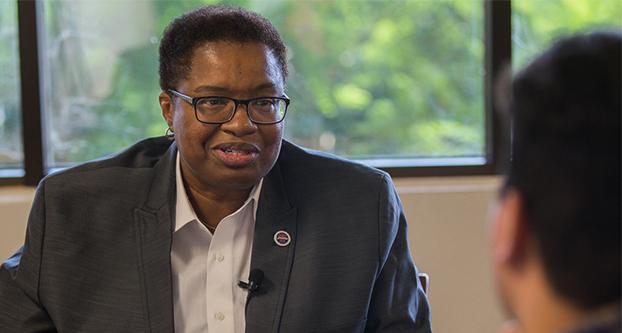Libraries have always been a part of Delritta Hornbuckle’s life, no matter where she has been.
“My father picked cotton on the fields of east Texas in the summers before trying to go to school,” she said as she reflected on her past recently. “I literally am maybe two descendants from African-American slaves in Texas.”
Education was always valued by her family. Her mother worked cleaning the homes of wealthy people. And during that time she would sit in the libraries in the homes and read.
It was clear. “The library was a refuge,” Hornbuckle said.
That refuge helped her gain more knowledge. It was also the key to her success.
“The library for me was basically a pathway for my parents, just upward mobility,” Hornbuckle said. “So I am basically that second generation of economic opportunity, and the library was the core of it.”
Education took her many places in life. Today, she is the new dean of library services at Fresno State’s Henry Madden Library. She was hired in September and took over for recently retired Peter McDonald.
Considered “the jewel of this campus,” Hornbuckle’s job will be to make sure the Henry Madden Library is a welcoming space for students.
Her undergraduate degree was earned at Texas A&M University. The pride and spirit that university has about agriculture is similar to that of Fresno State’s, she said.
After receiving her bachelor’s degree, she found herself in New York City. It was a place she always wished to live in. That is where she first started working in libraries. And she said New York City has one of the best public library systems.
“You have a very interesting library on every corner,” Hornbuckle said.
She worked in different types of libraries, including “special libraries” that house information on one single topic.
Throughout the city, Hornbuckle had access to endless information. Then the thought of learning more led her back to school.
“The library was that first source in terms of getting an education and understanding how important education was for my family,” Hornbuckle said.
She completed her Master of Library Science degree at the Pratt Institute. There, she began investing her knowledge on the fundamentals of running a library and the benefit it has on society.
“I was just a voracious reader around all of that history of just what libraries really mean and the difference they make in communities,” Hornbuckle said.
While preparing for a management role, she learned about what keeps a library running, like budgets and organizational development. She said that all of that experience plays a role in what she does today.
“Henry Madden is really where it’s all kind of culminated. I’m very excited to be here. This is a wonderful library,” Hornbuckle said.
Hornbuckle knew that the central San Joaquin Valley was a place of learning and diversity. She had always wanted to live in California too.
She added a few extra days to her vacation when she came for her interview and explored the Valley. The agricultural history and the current water struggles was intriguing to her.
Observing the university also opened Hornbuckle’s eyes to the rich cultures represented on campus. She said she admires the university’s efforts to highlight the importance of diversity and the progression of first-generation college students.
“That really made me feel at home,” she said.
But her mission to serve is one she has given careful thought to. She has a number of plans ready to implement so that the Henry Madden Library can grow as a community symbol of academic success.
“It’s really [about] helping them [students] understand how central libraries are,” Hornbuckle said. “It is the most basic social institution in our culture, and I think we really understand, libraries make a difference. They’re always a resource.”
She said she plans to increase external promotions to obtain more support from community members to improve the resources and facility.
“We have a whole new generation that we want to encourage to come to the library to support it,” Hornbuckle said.
As technology progresses, the question is: how are libraries affected? Hornbuckle said the library is the solution to “a world of information overload.”
“So that’s why in an academic library we really work closely with faculty members and the academic community to ensure the students are coming into the library — to understand information,” she said.
Hornbuckle offered that the library is where students can come and research their questions. They use their knowledge from the resources provided to map out their own discoveries, she said.
“It’s a process to understand the critical thinking — what’s good information and not so good information. And there’s resources to help you do that,” Hornbuckle said.
As she works from her office in south side of the library, the Valley she explored now shines outside her window. Her office is home for a job at a place where it all began ”” a library.
“This is where I think they [her parents] want me to be,” Hornbuckle said. “Every day I’m very grateful and very blessed that I’m here. It was a lot of hard work, but I think this is it.”




